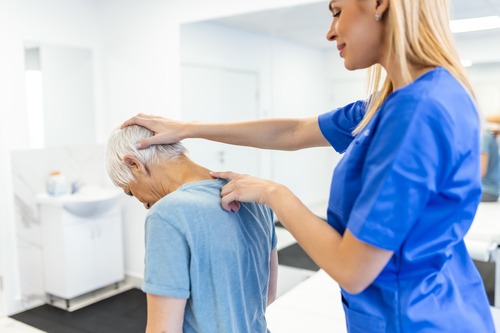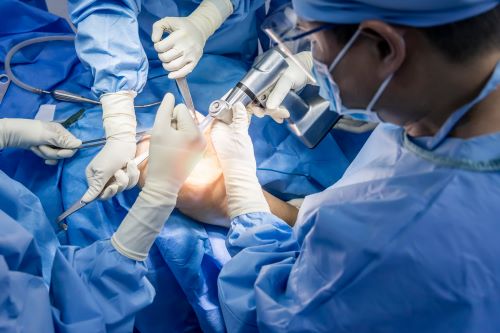Workplace injuries are unfortunately common and can be debilitating. They often arise from hazardous environments, exposure to harmful substances, and the physical demands of the job. From falls to repetitive stress injuries like tendonitis, workplace injuries can cause significant pain. Unaddressed, these injuries may develop into more serious conditions, so timely medical evaluation and treatment are essential.
At Georgia Spine & Orthopaedics in College Park, our priority is to help you return to your routine swiftly and with minimal pain. Our expert team treats a broad spectrum of conditions and offers individualized care plans tailored to your specific needs. Whether you require urgent care or advanced surgical interventions for pain management, we are committed to supporting you through your recovery and treatment process.
Call us today at 678-929-4494!
Steps to Take After a Workplace Injury
If you experience a workplace injury in College Park, Georgia, you should take the following steps.
Report the Injury Immediately
Promptly inform your supervisor of the incident. If possible, file a written report detailing what happened and the nature of your injuries.
Seek Medical Attention
Your health comes first. Even if the injury seems minor, get examined by a qualified College Park workplace injury doctor. For severe injuries, visit the emergency room or a local urgent care facility. Follow your doctor’s advice and treatment plan meticulously.
Document Everything
Maintain records of all medical reports, bills, and any communication with your employer or their insurance company. This documentation is vital for any workers’ compensation claims.
Return to Work Only When Cleared by a Doctor
Avoid resuming work until you have been cleared by a doctor to prevent prolonging the healing process or worsening the injury. Consult with our medical team for guidance on when it’s safe to return.
Common Causes of Work Injuries
While some industries like construction are more dangerous than others, workplace accidents can occur in any setting. Here are some of the most common ways people suffer a workplace injury.
Overexertion Injuries
These occur from strenuous activities like lifting, pulling, pushing, and throwing.
Slips and Trips
Many employees are injured by falling on wet or uneven surfaces or tripping over obstacles.
Falls from Heights
These are caused by falls from elevated areas like roofs, ladders, or stairways.
Reaction Injuries
Muscle strains and bodily trauma can stem from slipping or tripping without falling.
Falling Object Injuries
These happen when objects fall from shelves or are dropped, often leading to severe head injuries.
Collisions with Stationary Objects
Accidental collisions with walls, doors, cabinets, tables, and chairs are common.
Vehicle Accidents
Injuries sustained while driving for work-related activities, often resulting from auto collisions.
Machinery Accidents
Injuries caused by heavy machinery and equipment are common in factory settings.
Repetitive Motion Injuries
Harm from repetitive actions, such as typing, can lead to conditions like carpal tunnel syndrome, muscle strains, and back pain.
Preventative Measures for Workplace Injuries
The following strategies can help prevent workplace injuries.
Proper Form and Technique
Utilize correct form and technique for various tasks to reduce strain and injury risk. Wear appropriate attire to prevent loose clothing from becoming caught in machinery.
Regular Breaks
Take regular breaks to rest and stretch. Even in office settings, frequent movement and stretches can prevent fatigue and overuse injuries.
Appropriate Equipment Usage
Using the right tools and equipment for tasks reduces accident and injury risks. Participate in training to learn how to operate equipment and perform tasks safely.
Immediate Injury Reporting
Immediately report injuries to supervisors to enable timely treatment and workplace safety measures against future accidents.
Common Types of Work-Related Injuries
Musculoskeletal Injuries
These affect muscles, ligaments, tendons, joints, and bones. They arise from repetitive motion, overuse, or trauma. Examples include strains, sprains, carpal tunnel syndrome, tendonitis, and bursitis.
Dislocations
These occur when a bone is displaced from its normal position, often due to falls or other traumatic events.
Fractures
Broken bones commonly result from accidents, including slips, falls, and direct impacts.
Cervical Spine Injuries
Injuries to the neck area can lead to severe repercussions like spinal cord damage, paralysis, or even death. Workplace accidents often cause these injuries.
Thoracic Spine Injuries
Located below the cervical area, thoracic spine injuries can affect breathing and posture, stemming from high-impact accidents.
Lumbar Spine Injuries
Lower back injuries can impair hip and leg function, sometimes needing supportive devices.
Herniated Discs
A herniated disc happens when the soft, jellylike center of a spinal disc protrudes through a tear in the tough exterior. A herniated disk is sometimes called a slipped disk or a ruptured disk. When spinal discs herniate, they can compress nerves, leading to pain and numbness.
Spinal Cord Injuries
Direct injuries to the spinal cord can cause paralysis or loss of function, requiring immediate attention.
Treatment Approaches for Work Injuries
For minor injuries, treatments include rest, ice, compression, and elevation (RICE). More severe cases may require physical therapy, medication, or surgery.
We prioritize non-invasive treatments, starting with medications, exercise, therapy, and rehabilitation. Only when these methods don’t work do we consider surgical options.
Pain Management
Our team offers various treatments to alleviate pain caused by workplace injuries. These pain management techniques range from targeted exercises to personalized medication plans. We also utilize pain relief injections and nerve blocks.
Physical Therapy
Our physical therapy programs are designed to optimize musculoskeletal healing, improve mobility, and restore strength.
Broken Bone Treatment
We specialize in treating fractures, from minor stress injuries to complete breaks. For injuries requiring stabilization, we utilize bracing and casting. We may recommend orthopedic surgery for serious fractures.
Orthopedic Surgery
We perform a range of surgical procedures to address spinal conditions such as stenosis, disc herniation, and degenerative disc disease. These orthopedic surgeries aim to improve mobility and relieve pain.
Non-Surgical Spine Treatments
We’ve developed specialized non-surgical treatments including prescription medications, steroid injections, radiofrequency ablation, cognitive therapy, acupuncture, and joint injections.
Why Choose Our College Park Workplace Injury Doctors?
Georgia Spine & Orthopaedics is committed to helping you get back to your life after a work injury. Our team has the experience, compassion, and expertise to guide you through the recovery process.
Comprehensive Care and Support
At Georgia Spine & Orthopaedics, we focus on your physical well-being and emotional comfort during the healing process. We’re here to offer compassionate care and support as you recover.
Tailored Treatments
Our treatment plans are crafted to meet individual requirements, ensuring each patient receives the most suitable care for their condition.
Experienced Team
Our team consists of compassionate and skilled doctors with expertise in pain management, orthopedic surgery, and neurology.
Schedule Your Appointment Today
Georgia Spine & Orthopaedics understands the importance of timely care. When you book an appointment with us, we start by thoroughly diagnosing your injury and personalizing your treatment plan.
Contact us today at 678-929-4494 to schedule an appointment and begin your journey to recovery from a workplace injury.






